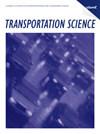城市交通网络的可靠路由策略
IF 4.8
2区 工程技术
Q1 OPERATIONS RESEARCH & MANAGEMENT SCIENCE
引用次数: 0
摘要
在城市交通网络中寻找最可靠路由策略的问题,是指在给定到达时间阈值的情况下,确定最大化准时到达目的地概率的时间适应性路由策略。该问题是在一个随机和随时间变化的网络上定义的,它捕捉到了现实世界中交通系统固有的不确定性和动态性。为了解决这个问题,我们提出了一种基于动态编程的算法,该算法得益于节点时间对队列的实现。除了在大多数情况下提高计算运行时间外,这种实现还支持不同的队列规则,从而产生了不同的算法方法:标签校正法和标签设置法。我们证明了算法的正确性,并推导出其最坏情况下的时间复杂度。我们介绍了在真实世界中节点数最多为[公式:见正文]的大规模运输网络上进行的计算实验,结果表明该算法是现有最先进方法的可行替代方案。对于相对严格的到达时间阈值,它可以快四倍,而对于较宽的阈值,它则具有竞争力。我们还通过实验评估了算法中使用的不同队列规则、节点时间对队列实施的收益,并比较了从可靠性和旅行时间目标中获得的最优策略。本文章由计算机程序翻译,如有差异,请以英文原文为准。
Reliable Routing Strategies on Urban Transportation Networks
The problem of finding the most reliable routing strategy on urban transportation networks refers to determining the time-adaptive routing policy that maximizes the probability of on-time arrival at a destination given an arrival time threshold. The problem is defined on a stochastic and time-dependent network that captures real-world transportation systems’ inherent uncertainty and dynamism. To solve this problem, we present a dynamic programming–based algorithm that benefits from a node-time pairs queue implementation. In addition to improving the computational running time in most cases, this implementation supports different queue disciplines, leading to different algorithmic approaches: label-correcting and label-setting methods. We prove the correctness of the algorithm and derive its worst case time complexity. We present computational experiments over real-world, large-scale transportation networks with up to [Formula: see text] nodes, showing that the algorithm is a viable alternative to existing state-of-the-art methods. It can be four times faster for relatively tight arrival time thresholds and is competitive for looser ones. We also present experiments assessing the different queue disciplines used within the algorithm, the gains of the node–time pairs queue implementation, and comparing optimal strategies obtained from reliability and travel time objectives.
求助全文
通过发布文献求助,成功后即可免费获取论文全文。
去求助
来源期刊

Transportation Science
工程技术-运筹学与管理科学
CiteScore
8.30
自引率
10.90%
发文量
111
审稿时长
12 months
期刊介绍:
Transportation Science, published quarterly by INFORMS, is the flagship journal of the Transportation Science and Logistics Society of INFORMS. As the foremost scientific journal in the cross-disciplinary operational research field of transportation analysis, Transportation Science publishes high-quality original contributions and surveys on phenomena associated with all modes of transportation, present and prospective, including mainly all levels of planning, design, economic, operational, and social aspects. Transportation Science focuses primarily on fundamental theories, coupled with observational and experimental studies of transportation and logistics phenomena and processes, mathematical models, advanced methodologies and novel applications in transportation and logistics systems analysis, planning and design. The journal covers a broad range of topics that include vehicular and human traffic flow theories, models and their application to traffic operations and management, strategic, tactical, and operational planning of transportation and logistics systems; performance analysis methods and system design and optimization; theories and analysis methods for network and spatial activity interaction, equilibrium and dynamics; economics of transportation system supply and evaluation; methodologies for analysis of transportation user behavior and the demand for transportation and logistics services.
Transportation Science is international in scope, with editors from nations around the globe. The editorial board reflects the diverse interdisciplinary interests of the transportation science and logistics community, with members that hold primary affiliations in engineering (civil, industrial, and aeronautical), physics, economics, applied mathematics, and business.
 求助内容:
求助内容: 应助结果提醒方式:
应助结果提醒方式:


